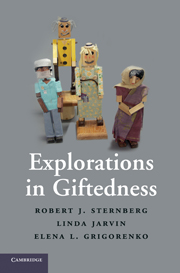Book contents
- Frontmatter
- Contents
- Preface
- 1 What Is Giftedness?
- 2 Theories of Giftedness
- 3 WICS as a Model of Giftedness
- 4 Intelligence and Giftedness
- 5 Creativity and Giftedness
- 6 Wisdom and Giftedness
- 7 Giftedness as Developing Expertise
- 8 Giftedness and Culture
- 9 Learning Disabilities, Giftedness, and Gifted/LD
- 10 Identifying the Gifted
- 11 Educating the Gifted
- References
- Index
8 - Giftedness and Culture
Published online by Cambridge University Press: 05 June 2012
- Frontmatter
- Contents
- Preface
- 1 What Is Giftedness?
- 2 Theories of Giftedness
- 3 WICS as a Model of Giftedness
- 4 Intelligence and Giftedness
- 5 Creativity and Giftedness
- 6 Wisdom and Giftedness
- 7 Giftedness as Developing Expertise
- 8 Giftedness and Culture
- 9 Learning Disabilities, Giftedness, and Gifted/LD
- 10 Identifying the Gifted
- 11 Educating the Gifted
- References
- Index
Summary
The study of culture and intelligence is based in part on the notion that behavior that in one cultural context is viewed as smart or even gifted may, in another cultural context, be stupid (Cole, Gay, Glick, & Sharp, 1971; Sternberg, 2004a; Sternberg & Grigorenko, 2007a). Stating one's political views honestly and openly, for example, may win one the top political job, such as the presidency, in one culture, and the gallows in another. Not all scholars believe that giftedness has any relativity at all: Herrnstein and Murray (1994), Lynn (2002, 2006, 2008), and Rushton (2000), for example, are among those who believe that IQs mean largely the samething, regardless of the culture in which one resides. In this chapter, we will disagree with this view.
One reason to study culture and intelligence is because they are so inextricably interlinked. Indeed, Tomasello (2001) has argued that culture is what, in large part, separates human from animal intelligence. Humans have evolved as they have, he believes, in part because of their cultural adaptations, which in turn develop from their ability, even in infancy from about 9 months onward, to understand others as intentional agents.
The conceptualization, assessment, and development of intelligence cannot be fully or even meaningfully understood outside their cultural context. Work that seeks to study intelligence acontextually may impose an (often Western) investigator's view of the world on the rest of the planet, frequently attempting to show that individuals who are more similar to the investigator are smarter than individuals who are less similar.
- Type
- Chapter
- Information
- Explorations in Giftedness , pp. 144 - 167Publisher: Cambridge University PressPrint publication year: 2010

